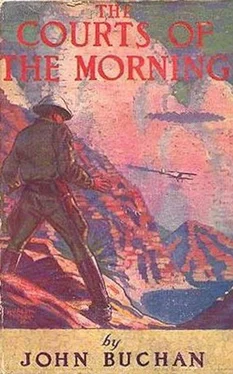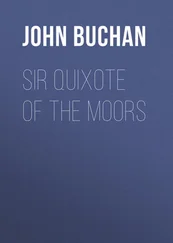John Buchan - The Courts of the Morning
Здесь есть возможность читать онлайн «John Buchan - The Courts of the Morning» — ознакомительный отрывок электронной книги совершенно бесплатно, а после прочтения отрывка купить полную версию. В некоторых случаях можно слушать аудио, скачать через торрент в формате fb2 и присутствует краткое содержание. Жанр: unrecognised, на английском языке. Описание произведения, (предисловие) а так же отзывы посетителей доступны на портале библиотеки ЛибКат.
- Название:The Courts of the Morning
- Автор:
- Жанр:
- Год:неизвестен
- ISBN:нет данных
- Рейтинг книги:3 / 5. Голосов: 1
-
Избранное:Добавить в избранное
- Отзывы:
-
Ваша оценка:
- 60
- 1
- 2
- 3
- 4
- 5
The Courts of the Morning: краткое содержание, описание и аннотация
Предлагаем к чтению аннотацию, описание, краткое содержание или предисловие (зависит от того, что написал сам автор книги «The Courts of the Morning»). Если вы не нашли необходимую информацию о книге — напишите в комментариях, мы постараемся отыскать её.
The Courts of the Morning — читать онлайн ознакомительный отрывок
Ниже представлен текст книги, разбитый по страницам. Система сохранения места последней прочитанной страницы, позволяет с удобством читать онлайн бесплатно книгу «The Courts of the Morning», без необходимости каждый раз заново искать на чём Вы остановились. Поставьте закладку, и сможете в любой момент перейти на страницу, на которой закончили чтение.
Интервал:
Закладка:
A maze of calles took him to the main Plaza, where a great baroque cathedral raised its sculptured front above a medley of beggars and vendors of holy medals. The square was shamefully paved, the façades of the old Spanish houses were often in disrepair, but the crumbling plaster and the blotched paint blended into something beautiful and haunting. Here it was very quiet, as if the city hushed itself in the environs of the house of God. To Archie it seemed that he was looking upon that ancient Olifa, before the hustling modern world was born, Olifa as it had appeared to the eyes of Captain Cook's sailors when they landed, a city which kept the manners and faith of sixteenth-century Spain. He entered the church, and found a vast, cavernous darkness like the inside of a mountain, candles twinkling like distant glow-worms, echoes of muttered prayers and the heavy sweetness of incense. After it the Plaza seemed as bright as a mountain-top.
Another labyrinth brought him into a different world. The great Avenida de la Paz is a creation of the last twenty years, and runs straight as a ruler from the villas of the most fashionable suburb to the old harbour of the city. In its making it has swallowed up much ancient derelict architecture, and many nests of squalid huts, but, since it was built with a clear purpose by a good architect, it is in itself a splendid thing, in which Olifa takes a fitting pride. Where Archie struck it, it was still residential, the home of the rank and fashion of the city, with the white mass of the Government buildings and the copper dome of the Parliament House rising beyond it. But as he walked westward it gradually changed. Soon it was all huge blocks of flats and shops, with here and there the arrogant palace of a bank or shipping company.
One of these caught Archie's attention. It was an immense square edifice built of the local marble, with a flight of steps running up to doors like those of the Baptistry in Florence. Two sentries with fixed bayonets were on guard, and at first he thought it a Government office. Then his eye caught a modest inscription above the entrance--Administración de Gran Seco. The name had stuck in his memory from last night's talk--linked with the sight of the four copper magnates and Don Alejandro's aloofness. The Gran Seco was a strange and comfortless place, and it was perched far up in the mountains. This gorgeous building was at variance with the atmosphere with which the name was invested for him, and he stared with lively curiosity at its magnificence.
Suddenly the great doors opened and a man came out, escorted by two bowing porters. The sentries saluted, a big limousine drew up, and he was borne away. Archie had a glimpse of a tall figure in dark grey clothes, and, what seemed out of keeping with the weather, a bowler hat. The face was middle-aged and bearded--a trim black beard like a naval officer's. As he passed, the man had glanced at him, and, even in that short second of time, there was something in those eyes which startled him. They seemed so furiously alive. There was nothing inquisitive in them, but they were searching, all-embracing. Archie felt that this was one who missed nothing and forgot nothing; he had had an impression of supreme competence which was as vivid as an electric shock. No wonder the Gran Seco was a success, he thought, if it had men of that quality in its management.
The broad pavements, the double line of trams, the shop-windows as soberly rich as those of the Rue de la Paix, the high white buildings narrowing in the distance to enfold a blue gleam of the sea, made an impressive picture of wealth and enlightenment. There was a curious absence of colour, for the people he passed seemed all to be wearing dark clothes; they were a quiet people, too, who spoke without the southern vehemence. Emancipation had come to the ladies of Olifa, for there were many abroad, walking delicately on the pavement, or showing their powdered prettiness in motor-cars. Here was none of the riotous life of the old quarter, and Archie had an impression of the city as elaborately civilised and of its richer inhabitants as decorous to the point of inanity. There were no peasants to be seen, nor a single beggar; the Avenida de la Paz seemed to be kept as a promenade for big business and cultivated leisure. Archie grinned when he remembered the picture he had formed of Olifa, as a decadent blend of ancient Spain and second-rate modern Europe, with a vast wild hinterland pressing in upon its streets. The reality was as polished and secure as Paris--a reticent Paris, with a dash of Wall Street.
One splash of colour caught his eye. It came from a big touring car, which had drawn up at the pavement's edge and had disgorged its occupants. The driver was a young man strangely clad in starched linen knickerbockers, a golf-jumper designed in a willow-plate pattern of blue and white, pale blue stockings, and a wide-brimmed straw hat. He sat negligently at the wheel, and as Archie stared at him he tilted his hat over his brow. Presently there emerged from the shop two girls and a second youth--the youth in snowy white flannels with a scarlet sash, and the girls in clothes the like of which Archie had never seen, but which in his own mind he classed as the kind of thing for a tropical garden-party. He noticed, since the extreme shortness of their skirts made their legs their most notable feature, that they had black patent-leather shoes with silver buckles, and wonderful shot-silver stockings.
"You all right, honey?" one of them addressed the driver.
"Fine. Got the candy you want?"
Then an argument arose between the two girls and the other youth, an argument conducted in a dialect unintelligible to Archie, and in voices which forcibly reminded him of the converse of a basket of kittens. The four in that discreet monochrome place were indecently conspicuous, but they were without modesty, and among the stares and whispers of the crowded pavement conducted their private dispute with the freedom of children. The driver at last grew bored.
"Aw, come on, Baby," he cried. "Get off the side-walk and come aboard. We got to hustle."
They obeyed him, and the car presently slid into the traffic, the driver's hat still tilted over his brows. Archie believed that he recognised one of the young women as a member of the party from the American yacht who had been dining in the hotel restaurant the night before. He rather resented their presence in Olifa. These half-witted children of pleasure were out of the picture which he had made for himself; they even conflicted with Olifa's conception of herself. "The United States," he told himself, "won't be too popular in Latin America if it unlooses on it much goods of that type."
At last the Avenida passed from shops and offices into a broad belt of garden, flanked on one side by the Customs House and on the other by the building which housed the Port authorities. Beyond them lay the green waters of the old harbour, and the very spot where the first Conquistadors had landed. The new harbour, where the copper from the Gran Seco was shipped, lay farther south, close to the railway-stations; the old one was now almost unused except for fishing-boats, and as a landing-place for the yachts which berthed in the outer basin behind the great breakwater. To the north was a little plaza which was all that remained of the first port of Olifa. It was a picturesque half-moon of crumbling stone, and seemed to be mainly composed of cafés and cinema houses.
Archie sniffed the salt breeze from the west, and limped cheerfully along the water-front, for he loved to be near the sea. In the outer basin he saw the funnels and top-gear of the yacht Corinna, on which he had aforetime enjoyed the Duke of Burminster's hospitality. It annoyed him that his friend should have sold or chartered it to the kind of people he had seen in the motor-car.
Читать дальшеИнтервал:
Закладка:
Похожие книги на «The Courts of the Morning»
Представляем Вашему вниманию похожие книги на «The Courts of the Morning» списком для выбора. Мы отобрали схожую по названию и смыслу литературу в надежде предоставить читателям больше вариантов отыскать новые, интересные, ещё непрочитанные произведения.
Обсуждение, отзывы о книге «The Courts of the Morning» и просто собственные мнения читателей. Оставьте ваши комментарии, напишите, что Вы думаете о произведении, его смысле или главных героях. Укажите что конкретно понравилось, а что нет, и почему Вы так считаете.












